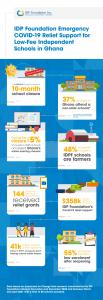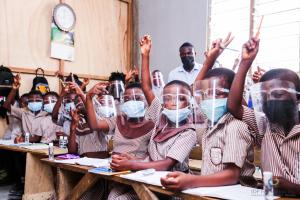Financial assistance to school proprietors provides urgent relief to low-fee private schools, helping them to reopen and preventing permanent closures
It’s absolutely critical that these schools and the dedicated proprietors who run them have the support they need to recover from the COVID-19 pandemic.”
CHICAGO, ILLINOIS AND ACCRA, GHANA, June 21, 2021 /EINPresswire.com/ -- The IDP Foundation, Inc. (IDPF), dedicated to encouraging and supporting sustainable solutions to complex global issues, has been disbursing urgent relief funds to vulnerable independent low-fee private schools that are part of its Rising Schools Program in Ghana.— Corina Gardner, Executive Director of the IDP Foundation
The urgent funding was informed by a system of independent vulnerability ratings applied to 144 schools by IDPF’s microfinance partner, Sinapi Aba Savings and Loans, alongside direct applications provided by proprietors who run the schools as well as findings from field assessments performed by Associates for Change (AfC), an Accra-based research and consulting firm. IDPF commissioned the assessment to investigate the impact of the COVID-19 pandemic on school operations and to identify the most vulnerable schools and the key areas of support needed for them to reopen and build resilience after 10 months of being closed.
“Affordable private schools play an essential role in developing countries,” says Corina Gardner, Executive Director of IDPF. “It’s absolutely critical that these schools and the dedicated proprietors who run them have the support they need to recover from the COVID-19 pandemic. If these schools are not supported so they can continue operations during this time of crisis—a time when the public-school system can’t easily absorb additional students—it would mean an increase in the number of students who are out of school, an unacceptable outcome and one we must do everything possible to prevent.”
According to the school year data from the Ghana Ministry of Education’s Basic National Profile 2019/2020, 48% of schools, or about 39,000 that educate children from as early as nursery school to junior high school, are private. Thirty-seven percent of all students in Ghana are enrolled in a private school of any kind. An estimated 40% of private schools in Ghana are low-fee private schools.
Highlights from the AfC assessment, conducted in two stages (prior to reopening and three months after reopening), included findings that approximately 15% of the low-fee private schools it assessed faced imminent bankruptcy while a further 65% were at risk of closing down unless they received urgent financial support. The report also showed that the large majority of these schools received very little, if any, COVID-19-related government support during closures.
To mitigate the financial strain faced by the schools, IDPF launched an immediate relief effort facilitated by Sinapi Aba Savings and Loans. More than 140 schools serving 41,000 students were awarded needs-based grants informed by Sinapi Alba’s assessments. This funding is likely to have impacted more than 900 teachers: 66% of grant applications cited support of teachers’ salaries as a primary reopening need. Other identified needs included: addressing 10 months of disrepair of buildings and vehicles; replacing classroom furniture and teaching/learning materials; personal protective equipment; and canteen items.
In addition, schools with active loans from the IDPF Rising Schools Program were relieved of any interest accrued during the loan holiday of 11 months via a direct payment to Sinapi Aba by IDPF. While it is standard practice for rescheduled loans to continue to accrue interest, this would have been a significant financial burden to proprietors. IDPF saw this relief as crucial in supporting the effort of these determined proprietors to reopen their schools.
“Following conversations with proprietors from the Rising Schools Program, it became very clear that financial relief was needed to ensure that these schools could reopen and continue to serve the communities they are so determined to support,” says Stephen Caleb Opuni, Country Director for the IDP Foundation in Ghana. “It is our utmost priority to help these schools now so that during this recovery period and beyond they can continue educating children whose parents so heavily rely on them. As we all think about the growing need for resilience in order to future-proof the education of the next generation, we must continue to develop sustainable edu-finance models that can exist within the government’s education framework.”
During the post-reopening assessment, AfC noted that 50% of the low-fee private schools had initial low enrollment because many students moved to a public school or, in some cases, didn’t return to school due to work or pregnancy. The report noted that only 5% of the students at the schools accessed Ghana’s online learning channel during the COVID-19 shutdowns while 11% and 18% accessed the radio and TV learning channels.
IDPF’s Gardner says the impact of closures on learning outcomes and enthusiasm for attending school could be catastrophic. “While IDPF has been committed to meeting the immediate financial needs of affordable private schools to build resilience and assist in their reopening, the crisis of learning loss is likely to be a long-term problem requiring a collective response,” says Gardner. “There is much to be done in the coming months and years. More than ever, education needs all hands on deck to rebuild. Independent low-fee private schools in developing countries can—and must—play a role in the long-term recovery from the COVID-19 pandemic."
About IDP Foundation’s Rising Schools Program
Established in 2008, IDPF is a nonprofit family foundation with a focus on supporting the function of low-fee private schools in improving access to quality education in the developing world through action, advocacy and alliances. A central part of the foundation’s philanthropic work is to participate in the building of a sustainable education ecosystem through a market-based approach that partners with local microfinanciers to support independent school proprietors with low-interest loans and crisis-relief grants as well as management and teacher training programs. Since creating its Rising Schools Program in 2008 with microfinance partner Sinapi Aba Savings and Loans, the IDP Foundation has supported 690 proprietors whose schools serve more than 150,000 students in Ghana.
Victoria Taylor
Wells Narrative Group
victoria@wellsnarrative.com
Visit us on social media:
Twitter
LinkedIn
IDP Foundation's Covid-19 Relief Support















